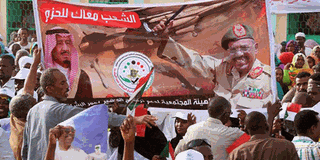Prime
Bashir's NCP condemns Sudan 'illegal govt' move to scrap party

Supporters hold a banner during a campaign meeting of the National Congress Party (NCP) in Khartoum, on March 31, 2015. AFP PHOTO
What you need to know:
- A civilian-led cabinet headed by Hamdok is charged with the day-to-day running of the country.
- Bashir is being held in a Khartoum prison facing trial on graft charges. Several other officials from his government and senior NCP members are also in jail
Ousted president Omar al-Bashir's party on Friday condemned Sudan's new "illegal government" for ordering its closure and the dismantling of his regime that ruled the country for 30 years.
Sudan's new authorities approved a law on Thursday ordering the Islamist leader's National Congress Party be dissolved, its assets seized and the regime dismantled as demanded by the protest movement that led to Bashir's fall in April.
On Friday, the NCP accused the authorities of taking a "reckless decision" in trying to confiscate its assets to tackle Sudan's economic crisis, which it said the new government had failed to address.
Confiscating its assets "is nothing more than a moral scandal, an act of intellectual bankruptcy and a total failure on the part of the illegal government," the NCP said on its Facebook page.
"The party is not bothered by any law or decision issued against it as the NCP is a strong party and its ideas will prevail."
The authorities have also banned personalities from the former regime from taking part in political activities for 10 years.
The new ruling sovereign council and cabinet led by Prime Minister Abdalla Hamdok passed the law on Thursday, ruling that the NCP be "dissolved" and its registration "cancelled from the list of political parties in Sudan".
'No rule of law'
Bashir seized power on June 30, 1989 in an Islamist-backed coup that toppled the elected government of prime minister Sadiq al-Mahdi.
Hamdok said the law to dissolve the party and dismantle the regime was "not revenge" against the former rulers.
"It aims to preserve the dignity of Sudanese people which was crushed by dishonest people," he wrote on Twitter.
"This law aims to recover the plundered wealth of the people."
The Sudanese Professionals Association, the group that initially led protests against Bashir, said in a statement that the decision would help "building a democratic civilian state".
But the NCP said the protest movement was turning the country's transition period into one where "no rule of law or equality prevails".
"The FFC (Forces of Freedom and Change) is trying to drag the country into war, chaos and instability ... the law will only add to more tensions, extremism and destruction of political life in our country."
Hardline Islamist cleric Mohamed Ali Jazuli warned that the law had potential to trigger future conflict in Sudan.
"This law is part of a regional project aimed at excluding Islam from all aspects of the state ... this would drag the country into a civil war," Jazuli said in his sermon as he led the weekly Muslim prayers at a mosque in the capital.
On Thursday, the sovereign council and the cabinet also formally scrapped a controversial public order law that had severely curtailed women's rights under Bashir.
Thousands of women were flogged, fined and even jailed under the law, which activists said primarily targeted women through harsh interpretations of Islamic sharia law.
'Big step for women's rights'
Activists say security forces have used the law to arrest women for attending private parties or wearing trousers.
"This law is notorious for being used as a tool of exploitation, humiliation & violation of rights," Hamdok wrote on Twitter earlier on Friday.
Rights group Amnesty International's Seif Magango said the scrapping of the public order law was "a big step forward for women's rights in Sudan".
"The transitional government must now ensure that the entire oppressive public order regime is abolished," he said in a statement.
The public order law had created simmering anger for decades among women, who were at the forefront of street protests that erupted in December 2018.
The demonstrations quickly turned into a nationwide anti-regime movement that finally led to Bashir's ouster by the army on April 11.
In August, a joint civilian-military sovereign council was formed to oversee a transition to civilian rule as demanded by protesters.
A civilian-led cabinet headed by Hamdok is charged with the day-to-day running of the country.
Bashir is being held in a Khartoum prison facing trial on graft charges. Several other officials from his government and senior NCP members are also in jail.



